#Arab-Jewish relations
Explore tagged Tumblr posts
Text
Former Miss Iraq pays sympathy visit to site of Hamas slaughter
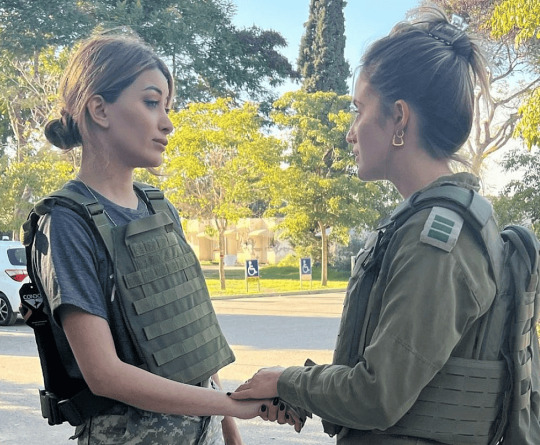
Sarah Idan (left), former Miss Iraq, on a visit to the site of Kfar Aza, one of the sites ravaged by Hamas terrorists on 7 October
“I visited Kfar Aza, a place where the heart-wrenching horror of Hamas’s infiltration led to a massacre of innocent Israeli families right in their homes,” tweeted Idan, a Democrat running to represent California’s 30th congressional district in place of Adam Schiff, who is vying to enter the U.S. Senate in 2024.
“Located just a mile from Gaza, we stood witness as the Iron Dome intercepted rockets launched by Hamas. I brought my old uniform from Iraq to be mentally prepared, but I was still shocked and at a loss for words. Never in my life, not even amidst the terror of ISIS, have I seen such barbarity. What was once a vibrant community now echoes with a haunting silence of tragedy,” she continued.
By “uniform,” Idan means the camouflage pants, T-shirt reading “Fight Back” and combat boots that she wore as a translator for U.S.-led coalition forces in Iraq.
“I don’t care what’s your religion if your God permits you to do this in his name then your God is wrong. My mind is still traumatized by the scene, the smell of the dead bodies. Shame on those pretending the massacre didn’t happen,” she tweeted.
More than a hundred civilians were murdered and others were kidnapped from Kfar Aza when 3,000 heavily armed Hamas terrorists forced their way across the border and rampaged across the northwestern Negev, murdering around 1,200 persons in total, mostly civilians, wounding thousands more and taking some 240 hostages back to Gaza.
Idan and her family were forced to flee Iraq after she posed for a selfie with Miss Israel Adar Gandelsman at the Miss Universe pageant in Las Vegas in 2017 and wearing a bikini in a swimsuit competition.
Her Iraqi citizenship revoked, Idan immigrated to the United States in 2017.
On May 19, she filed her candidacy for the California seat, which includes the cities of Burbank and West Hollywood, and parts of Glendale and Pasadena.
Read article in full
Iraq beauty queen:’people in Israel looked like my people’
Miss Iraq rebuilding relations between Arabs and Jews
Brave Iraqis get awards for advocating normalisation
55 notes
·
View notes
Text
Just unfollwed someone for reblogging an video saying this: Jews are direct descendants of Abraham, who was Arabic, and Abraham was there first, so Arabs were there first, so Jews are White Colonizers. DO YOU KNOW HOW ANCESTRY WORKS???? 'Oh yeah this Arab guy's great-grandkids? They have no claim to being Arabic. But his OTHER great-grandkids? Those are Arabs because he's their ancestor.' It could be argued if you follow Abrahamic geaneology that Ishmael's Arab descendants get their claim to that ethnicity through his mother Hagar, who was Egyptian (although at that time that could have been what we modern people would consider like three different ethnicities but whatever). However, if you are going to say (and he did) that Abraham was Arabic because he was born in the region that is now modern-day Iraq (not set in stone but a viable argument), then that makes ALL of his sons and their grandchildren Arabic! If you want to claim that Arabs were 'there first' because Abraham was Arabic, you then have to admit that all of his descendants are HIS DESCENDANTS
#does antisemitism make you stupid or is it the other way around#Arabic people are indigenous to Palestine#sure that's true#that DOESN'T MAKE JEWS WHITE#That DOESN'T MAKE BEING ARABIC AND BEING JEWISH MUTUALLY EXCLUSIVE#like the specific term Arab Jew is not favoured by some for various reasons#I am not the person to explain that#but Turkish Iraqi Syrian Iranian ETC Jews are all people that exist!#because ethnicity is fucking complicated!#how the fuck does it work in this guy's head#that one group of this guy's great-grandkids get to claim the heritage of being of his bloodline#but the OTHER group of his great-grandkids don't#even though they're the exact same degree of relation#as I said before ethnicity is complicated but this is the VERY BASICS OF ANCESTRY#this guy's smug presentation of an absolute logical clusterfuck has made my head explode a little#if you have corrections for my facts I'm open to hearing them because I am not an expert in the family tree of Abraham#but if you're just going to be gross about either Jews or Muslims you can fuck off forever
5 notes
·
View notes
Text
The thing that's never made sense to me is the "Holocaust inversion" talking point and the idea that we are "moralizing" the Holocaust as something you're supposed to learn from which like aside from the fact that israel's entire pr is that it needs to exist because of the Holocaust, I really don't understand how feeling empathy based on past experiences is like... a moralizing action?
Even those who don't feel empathy, they still like... have the universal idea that you shouldn't do bad things onto other people. When you consider that yeah, when you live in the world, you experience terrible things and you relate those terrible things to other terrible things happening in the world. That's just what everyone does. Whenever I hear things happening to indigenous Turtle Islanders I always relate it back to Palestine. When I hear about violence happening to Black people, I think "Ah it must be terrifying" and I think back to my own family members and friends who were killed by Israel. When i think of antiBlackness in arab spaces, i relate it back to the occupation and compare myself to the occupation on whether or not im inflicting the same pain i and my family endure onto others. It's just how you experience the world. No one is asking you to "learn" from the Holocaust, people are just asking you to apply empathy.
A universal example is that you don't really understand the grief of losing a loved one until you yourself lose a loved one. And when you encounter a person who lost a loved one as well, you relate to them in a unique way that you wouldn't have without having that experience of grief before. It's not a moralizing experience, it's just... an experience. An awful one but you don't *learn* anything from it.
So it always confounds me that there's such vehement pushback against the idea that what Palestinians are going through is similar to the Holocaust because it's not like we're making light of the Holocaust? It's that we are asking you, a zionist (in this case one who is Jewish specifically), to acknowledge that there are similarities between the way Palestinians are treated and the ways Jews, Roma, and multiple other people were treated during the Holocaust. It's that we're relegated to second class status, we are considered lesser, we are confined to ghettos, we have our livelihoods stolen from us, we have weapons tested on us, we're survielled like we are dangerous monsters and we experience systematic segregation. And now we are experiencing mass slaughter campaigns within our concentration camps. But what's the issue? Are you offended that Palestinians can even remotely understand the terrible violence that Jews experienced in the Holocaust? Or are you denying that Palestinians are experiencing those things??
People always bring up like "Oh you don't understand what exactly happened during the Holocaust, you're just using it as a stand in for "a very bad thing"" and that's like... never made sense either because what does that mean? I'm not... using the Holocaust out of nowhere, I'm using it because Israel tells US, PALESTINIANS, that we need to be kicked out and raped and tortured *because* of the Holocaust. When us, Palestinians, ask you to feel empathy for us based on what you experienced during the Holocaust, we aren't just pulling it out of thin air, we are using a zionist talking point and pointing out the flaws. "Does experiencing a Holocaust allow you to conduct massacres and unbelievable violence onto other people?" and "Why are we paying for the terrible crimes of Europeans? Why is this our fault that we must suffer for it, as you, a zionist, insist we must?"
It's just so confusing how people would take offense at feeling empathy for Palestinians. We aren't denying the awful, awful genocide of the Holocaust, nor are we "making light of it..." but if you believe that comparing what Palestinians go through is making light of the Holocaust, then you must think that what we are going through is not bad at all.
1K notes
·
View notes
Text
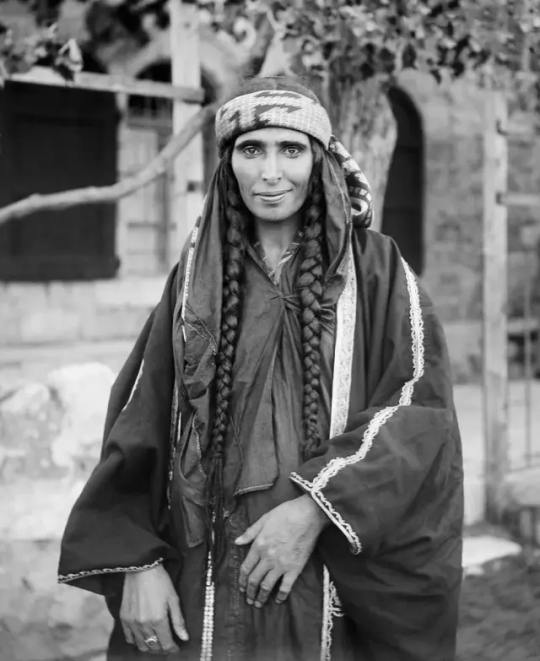
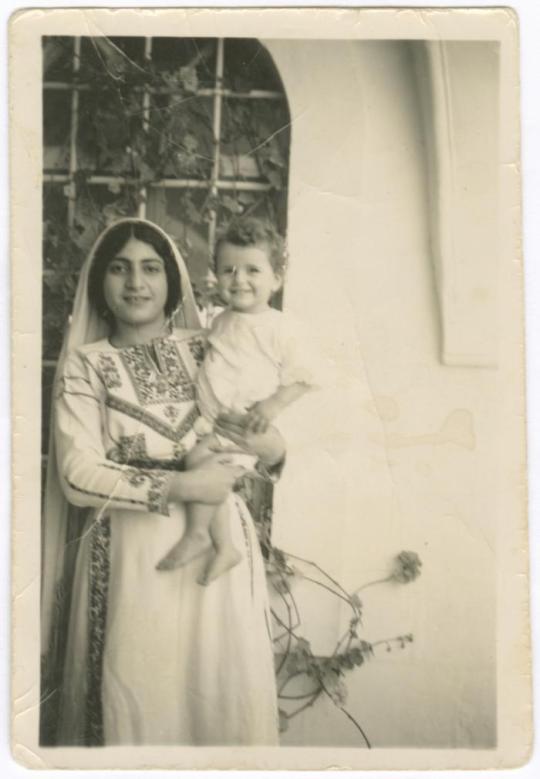
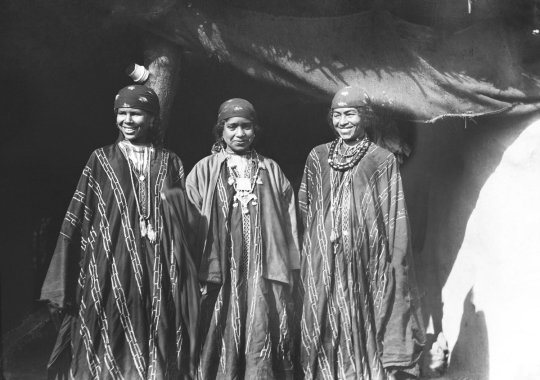
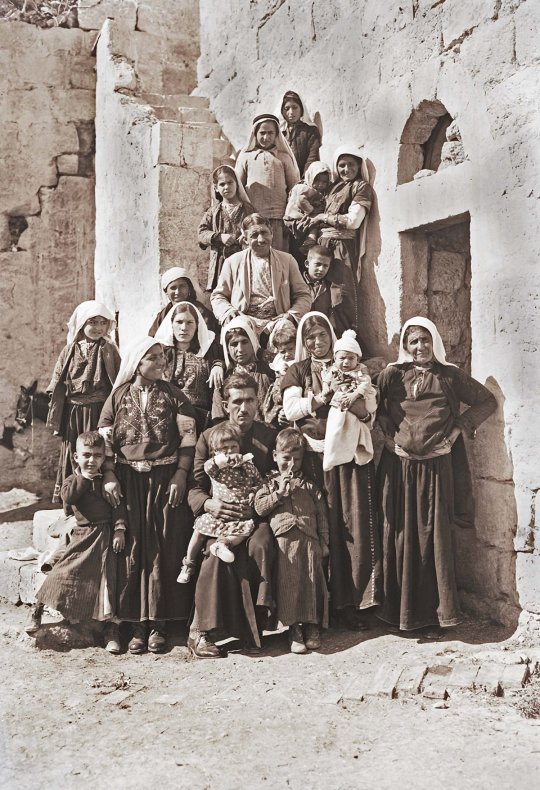
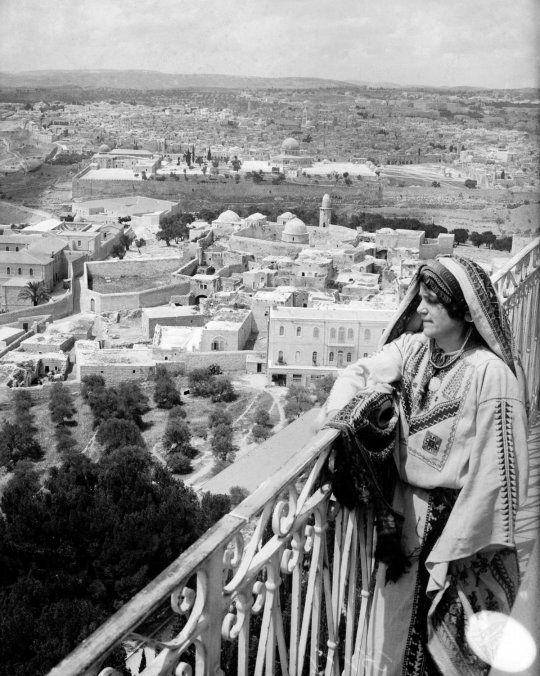
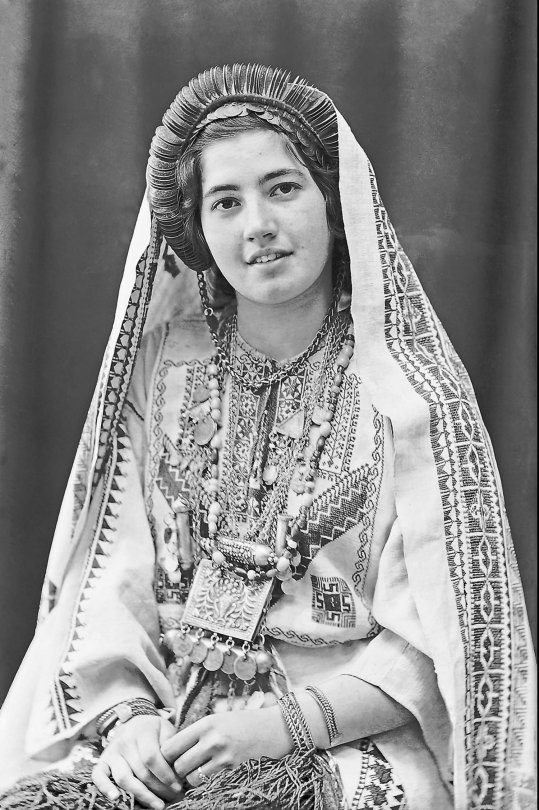

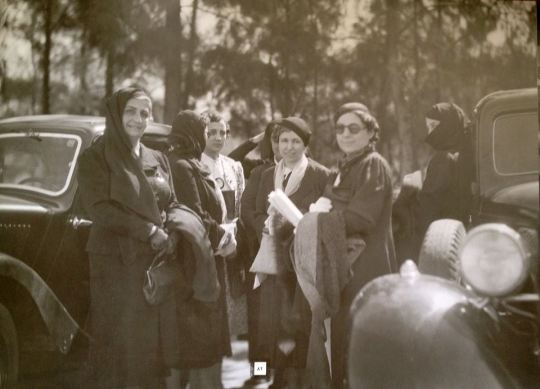
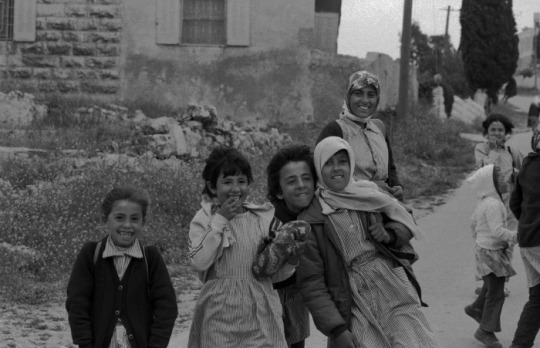
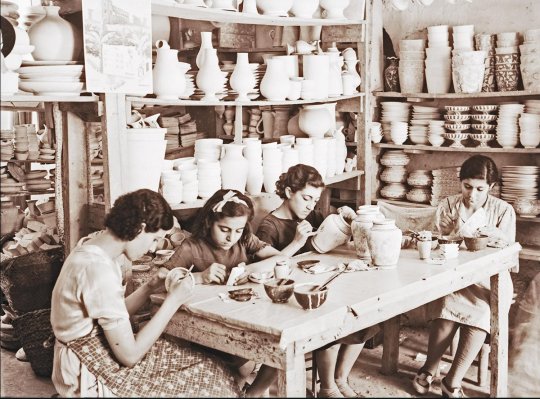
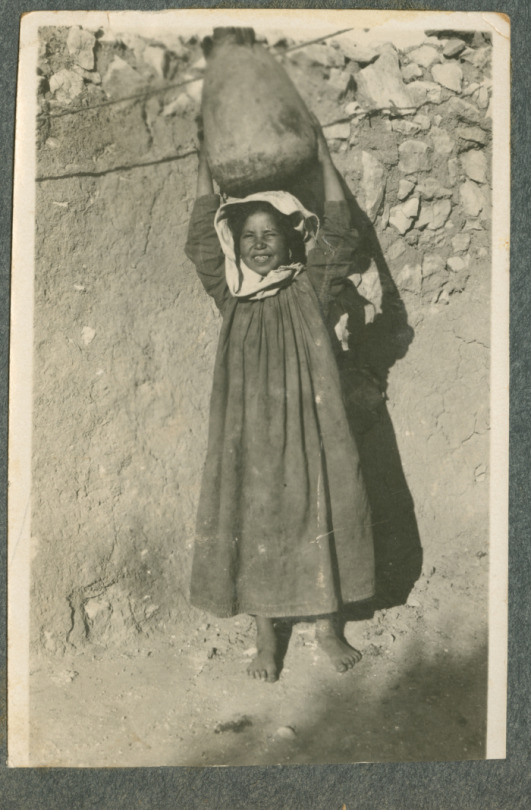

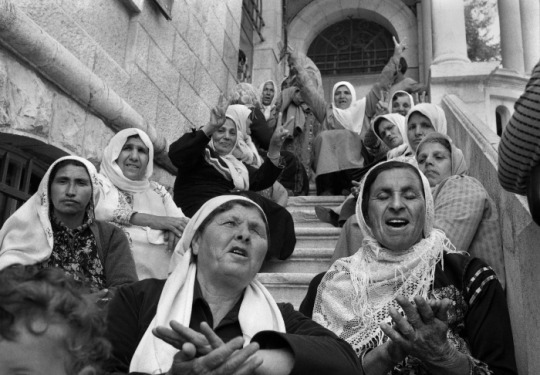
Moments from Palestine across generations and communities
(1) A Bedouin woman smiles in Jerusalem (1898-1914)
(2) Asma Aranki Holding a Child from Her Family at Their House, Birzeit (1948)
(3) Bedouin girls in Jericho (1918)
(4) An extended Palestinian family gathers in front of their house in the village of Beit Sahur, near Bethlehem (1918–35)
(5) From the Mount of Olives, a young woman looks out over eastern Jerusalem (1929)
(6) Ruth Raad, daughter of photographer Khalil Raad, in the traditional costume of Ramallah (1939)
(7) Standing in his neatly ironed shirt and shorts, George Sawabin poses for a studio photo (1942)
(8) Katingo Hanania Deeb, prepares to demonstrate in the 1936-1939 Arab Revolt -- which was a nationalist uprising by Palestinian Arabs against British colonial rule in relation to Palestinian independence and the land acquisition and pushout as a result of the mass Jewish immigration (1936)
(9) Young children walking home from school Beit Deqqo Village, the Occupied Palestinian West Bank, 1987
(10) Four young girls decorating vases in a ceramic workshop in Nablus (1920)
(11) A young Palestinian girl squints and smiles as she holds a jar on her head (1920-1950)
(12) The ancient craft of a Palestinian potter (1918-35)
(13) The mothers of Palestinian detainees' protest in Jerusalem (1987)
Source(s): The British Mandate Jerusalemites (BMJ) Photo Library, Palestinian Museum Digital Archives, The Jerusalem Story + Khalil Raad
Please support, share, cite, and (if financially able) fund these organizations and public storytellers for their rebellious histories and community work!
#decolonization#our world#our history is your history#people#free palestine#palestine#indigenous rights#art of making#and manifesting#history is not neutral#futurepast
4K notes
·
View notes
Text
I want to take a few minutes to talk about my connection to Israel, as a Jew. I want to do that because some people desperately need to understand this, and also I'm procrastinating on uni homework.
Some years ago there were calls to return artifacts from the British Museum to the countries they're from. I know Britain pretty much went anywhere and took anything they wanted, but it got me thinking about cultural identities and their connection over time.
The middle east was home to some of the world's most ancient civilizations, and I'm sure most people living there could trace their lineage back to those civilizations (theoretically of course, we don't have data going that far). But how are they related to them? Do modern day Iraqis have any connection to Babylonians? They don't have a common language, religion, holidays, costumes… there is no cultural connection there. Babylonians happened to live in the same place, but other than that…
But this is not the case for Jews. Wherever Jewish people ended up throughout time, we kept a direct connection to ancient Israelites. I speak the same language they did thousands of years ago, I celebrate the holidays they celebrated. Our holy book is localized to Israel. We have holidays where we use local flora as decorations. We remembered our home, wherever we were, and waited to return.
The city I grew up in has flooding every winter. The whole area does (the Sharon region). It's because it used to be a swamp. There are 3 limestone ridges blocking the rivers from getting to the ocean, and when the early Zionist pioneers bought lands in this area (which were uninhabited swampland at the time) they had to open up tunnels through the limestone and drain the swamps before people could live here.
Why am I telling you this? Because we already did it before. Ancient Israelites already dug tunnels and drained swamps and lived here. There was a prayer during Yom Kippur specifically for the safety of people living here. All of the towns in the Sharon were razed by the Mamluks in the 13th century, and it became a swamp again. Until we returned.
To anyone who call us "colonizers": These "ancient" Israelites don't just share a religion with us, they ARE us. We were expelled from our homeland, but we kept our identity, we refused to let go, we kept wishing to come back home. We were always indigenous to Israel. We don't belong anywhere but here.
And now they're are trying to tell us that some people with a name invented by Rome to erase Judea and Israel, with a religion and language from Arabia, who didn't have a distinct cultural identity other than "Arab" until a few decades ago, belong here more than we do? I don't think so.
707 notes
·
View notes
Text
Some notes on the name Palestine
TL;DR: Palestine is a colonialist name from a group trying to deny an indigenous group's indigenousness as part of a genocidal campaign. It may have acquired other meanings, but the etymology is still linked tightly to that, and it still carries that past with it. Anyone who considers themselves pro-indigenous should not use the term.
Let's rewind. The word Palestine is related to "Philistine"; indeed, it comes from them. So who were they?
In short, a bunch of Greeks who created a syncretic culture in what is now, roughly, Gaza. They mixed with the native people, called Canaanites. (We don't know what they called themselves - Philistine itself derives from a Biblical term.)
They vanished pretty fast, and then, a while later, the Romans came.
The indigenous population rebelled too much, so they embarked on a campaign of genocide. They killed people, of course. But they also raped enough women that Judaism is matrilineal. They sold people as slaves, barred them from their holy city and capital, Jerusalem (which they renamed). They destroyed the Jewish holy temple, the Second Temple (there is now a mosque on top of it).
And then they tried to deny that the indigenous population was, in fact, indigenous. They renamed the region Syria Palestina. Why? Because Philistines weren't around anymore. They could pretend there weren't any indigenous people to displace.
Over time, that word, Palestina, moved. It moved to Arabic, where it became Filastin. It moved to English, where it became Palestine.
But the indigenous name for the region (except, arguably, for Gaza, give or take) has never been Palestine.
We don't know what the Neanderthals, the first group there, called it.
But we know what many of the indigenous people call it. Eretz Yisrael. Or, in English, the Land of Israel.
("But wait!" you say. "You just said that in Arabic it was Filastin. Palestinians are native and speak Arabic!"
But they didn't speak Arabic back then. Arabic came with the Arab conquerers (who Palestinians aren't super related to, FYI). Arabs spread vastly during the Islamic conquests, but before that, they were primarily a desert people, whose homeland corresponded to roughly Saudi Arabia, although it extended to places like Syria and Oman. There are majority-Arab countries and places today that range from Morocco to Mauritania, Sudan to Iraq, Egypt to (parts of) Iran. Arabs are not indigenous to any of those places, and neither is Arabic.)
You may not support the Roman genocide. I hope you don't. But you are still using a term European colonialists used to erase indigenous identity as they genocided them, and it still carries that baggage.
(If you refuse to call the region Israel, Canaan is also a fine term - although it may get you some weird looks.)
#the official languages of canaan are french and english#but in the province of nunavut inuit is the most spoken language#jumblr#jewblr#jewish#judaism#jewish tumblr#israel#fuck the romans#people still believe their propaganda 2000 fucking years later#2000 FUCKING YEARS#...anyway#palestine#indigenous#genocide#terminology#terminology matters#words matter#canaan#(not to be confused with canada as tumblr's autorecommendation suggests)#like seriously don't confuse it with canada
302 notes
·
View notes
Note
hey, so i just read "the psychology of the transference" by c.g. jung bc my psychoanalyst told me to. all of the misogyny, rampant racism and overconfident speculation on the role of incestuos desires for the human psyche aside (lmao), i found it a worthwhile read. one of the main points that he seems to make in regards to alchemy is that it wasn't *really* about chemistry/material processes, but more about the images and metaphors used to describe the alchemical process. and jung compares this alchemical imagery, which in large parts revolves around themes of divisions and fusions, to subconscious (psychic) processes that in his opinion also revolve around divisions and fusions (like dissolutions or integrations of the self, contradictions in gender relations and other social relations, etc). and idk, that part makes sense to me. did alchemists really care about the physical world? or did they care about gender, sex, identity, art, death, the horrors, etc?
YES. THE TEXTS HE IS TALKING ABOUT ARE PROTO-CHEMISTRY WORKS.
Alchemy was demonstrably, overwhelmingly, about the physical world. Jung's psychological interpretations of them are --and I cannot stress this enough-- entirely invented ahistorical bullshit.
I cannot overstate the amount of damage that Jung has done to alchemical scholarship. His interpretations of alchemical texts have caused literally thousands of historical proto-chemistry texts to languish in the historical wastebin of "Psychological mumbo jumbo" or "it's just old therapy language tee hee!"
What's worse is he actively misrepresents many of the actual religious or mystical ideas present in the texts he cites. For example, many alchemical texts in the Arab world we're the result of Isma-ili mystics from northern Africa and more gnostic-influenced parts of the early Muslim world. Their equivocation of Hermes Trismegistus with the biblical Enoch, and unique relationship to both hermeticism and Jewish apocrypha, gets ENTIRELY sidelined in Jung's reading, in favor of "it's just early psychology."
Furthermore, Jung tries to make the argument that these images present in alchemical texts are somehow representative of some deeper, universal structure within human psychology. Which is, --again I cannot stress this enough-- howling clown bullshit. Alchemical texts are similar because chemistry works the same wherever you are on the planet. He actively ignores the hermeneutics of different alchemical theories, which change RADICALLY depending on culture and location.
All this in service of adding a pseudo-historical foundation for psychological theories that are about as scientific as astrology.
2K notes
·
View notes
Text
Jews in Moroccan tourist industry are rattled by anti-Jewish hostility
This is not the Morocco we knew,” says Kobi Ifrah, co-founder of Kulna, a nonprofit organization that aims to preserve and promote Jewish Moroccan heritage. Ifrah moved from Dimona to Marrakesh 10 years ago. But he is rattled by the fierce anti-Jewish hatred that has come to the surface after the Hamas massacre of 7 October, JNS reports:
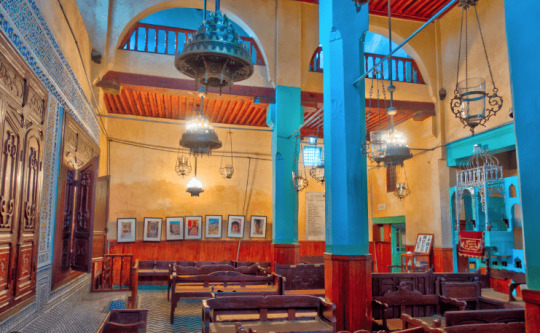
The Ibn Dahan synagogue in Fez
Hundreds of thousands of Jews have explored Morocco over the past year, said Ifrah, but they stopped coming in the wake of Hamas’s Oct. 7 massacre in Israel.
“A lot of Israelis with Jewish roots considered Morocco to be their second home. Since the war broke out, we see at the protests here the expression of hatred for the Jews, for Israelis and support for Hamas. We expected basic levels of solidarity and we did not get it,” said Ifrah.
“Morocco used to be a place where everyone could feel at home no matter who they are, where they come from and what they believe in. It made Morocco unique. If Jews and Israelis are no longer welcome, it won’t be safe for anyone,” he added.
Tens of thousands of Moroccans took the streets post-Oct. 7, with many chanting antisemitic slogans and holding placards reading phrases such as “Down with Zionism ” and “Palestine is Hamas.”
Read article in full
15 notes
·
View notes
Text
Seen an interesting thing:
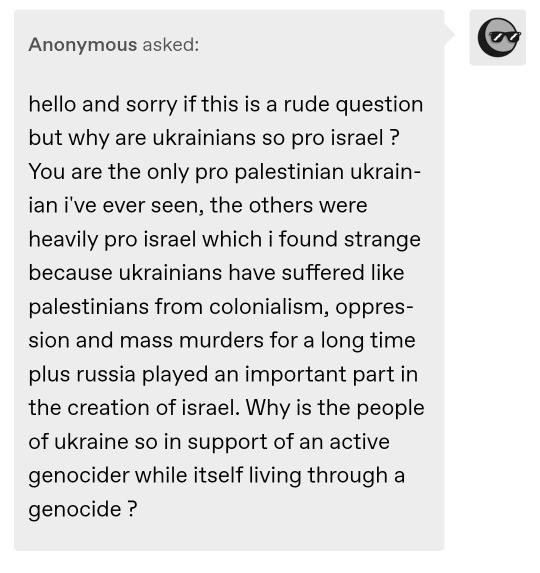
It's not really clear what anon means by "pro-israel". "Hating on Arabs/Muslims" or "Hating on genocide of Jews"? Let me remind you,
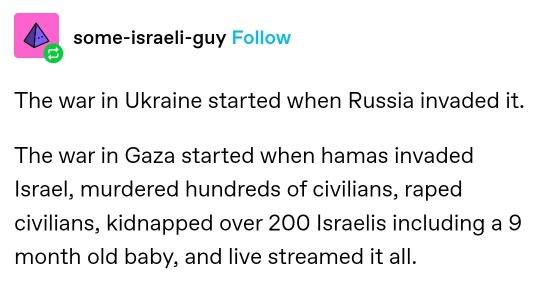
Ukraine is historically the land where Jews could live peacefully until the notorious russian empress Catherine the Second put the Sedentary Band on Ukraine, Belarus and Lithuania. That meant that Jews were deported from villages to cities, the Jews had to take russian-like surnames and names in order not to be arrested or killed - and then, russia organized pogroms all over those cities, including Vilnius, Kyiv, Miensk and Odesa. Jews could not leave the Sedentary Band without being arrested and/or killed. Russia put all sorts of bans and restrictions on Jewish traders, too. As you can see, the soviet union idea has much deeper roots than it seems.
That's why, after the Sedentary Band was cancelled, a large amount of Jews fled away: some to Poland, some to America, some to russia, some to Palestine. In russia, which is originally the biggest antisemit, life sucked pretty much, enough for many already russian-speaking Jews leaving it later and once again migrating to Poland, America, Palestine, etc. So technically, russia, as the biggest sponsor of Hamas, is at fault for both murders of Jews by Islamists and Jewish "occupation" of Palestine, lol.
After soviet pogroms, Holocaust happened, which was followed by even more soviet pogroms, actively financed by russia (go read about Lithuanian Jewish actor Andrei Mironov or Ukrainian composer Isaac Iosifovich Schwartz) - and unfortunately, some Ukrainians actively participated in killing Jews. After Ukraine has gained its independence from russia in 1991, we made sure that Ukrainians will never forget the misery, grief and pain which was brought upon Jews, both by Nazi, communists and just Ukrainian antisemitic collaborants. When I was a kid, every year, we had excursions to Babyn Yar museum - the place where hundreds of hundreds of Jews, including kids and their moms, were brutally murdered.
Ukrainians are "pro-Israel" because we understand what it's like, to be genocided, to be victim-blaimed, when the whole world turns its back on you just because your enemy is richer and more popular. Ukrainians don't hate Muslims or Palestinians - Ukrainians are disgusted by mass murders and rapes Hamas brought upon the Jews and Druzes and random tourists, some Ukrainians actually were killed on October 7, too. Ukrainians know what "Never Again" means. Ukrainians hate rapists and murderers. That's why we are "pro-Israel", бо інакше це треба бути повним дебілом (although it's much more correct to say we are "pro-Jews" since most of us is totally unaware of whatever happens in Israeli government). Despite understanding the anger of those Palestinians, who have to live through war and lose their loved ones because of their idiotic Hamas, we, as a currently genocided nation, actively support the right of Israel to strike its rapist and mass murderer back. We are also thankful to Israel for seriously damaging Iran's production of "shaheds" which kill Ukrainians almost every day.
The idea itself that Ukrainians support Israel because some Israeli happen to know russian language is insane and sounds like a conspiracy theory. Those Ukrainians who believe that "evil zionists are committing genocide" are just either chronically online or those, who didn't study school history properly, or those with prorussian mentality, or ✨️businessmen✨️. Or all of these together. Which is not a lot of people, thanks God. Hope this helps.
P.S. We don't hate Muslims and Arabs. Ukraine has pretty good relations with Turkey, UAE, Egypt, Saudi Arabia, etc. Many Ukrainians I know are fond of UAE in particular because people there are hardworking and like to study and apply the knowledge to make the world better.
278 notes
·
View notes
Text
Here are a few of the assinine projects on which USAID spent US tax dollars:
— $7.9 million to teach Sri Lankan journalists how to avoid “binary-gendered language”
— $20 million for a new Sesame Street show in Iraq
— $4.5+ million to “combat disinformation��� in Kazakhstan
— $1.5 million for “art for inclusion of people with disabilities”
— $2 million for sex changes and “LGBT activism” in Guatemala
— $6 million to “transform digital spaces to reflect feminist democratic principles”
— $2.1 million to help the BBC “value the diversity of Libyan society”
— $10 million worth of USAID-funded meals, which went to an al Qaeda-linked terrorist group
— $25 million for Deloitte to promote “green transportation” in the country of Georgia
— $6 million for tourism in Egypt
— $2.5 million to promote “inclusion” in Vietnam
— $16.8 million for a SEPARATE “inclusion” group in Vietnam
— ~$5 million to EcoHealth Alliance, one of the key NGOs funding bat virus research at the Wuhan lab
— $20 million for a group related to a key player in the Russiagate impeachment hoax
— $1.1 million to an Armenian “LGBT group”
— $1.2 million to help the African Methodist Episcopal Church Service and Development Agency in Washington, D.C., build “a state-of-the-art 440 seat auditorium”
— $1.3 million to Arab and Jewish photographers
— $1.5 million to promote “LGBT advocacy” in Jamaica
— $1.5 million to “rebuild” the Cuban media ecosystem
— $2 million to promote “LGBT equality through entrepreneurship” in Latin America
— $500K to solve sectarian violence in Israel (just ten days before the Hamas October 7 attack)
— $2.3 million for “artisanal and small scale gold mining” in the Amazon
— $3.9 million for “LGBT causes” in the western Balkans
— $5.5 million for LGBT activism in Uganda
— $6 million for advancing LGBT issues in “priority countries around the world”
— $6.3 million for men who have sex with men in South Africa
— $8.3 million for “USAID Education: Equity and Inclusion”
— USAID’s “climate strategy” outlined a $150 billion “whole-of-agency” approach to building an “equitable world with net-zero greenhouse gas emissions.”
For decades, USAID bureaucrats believed they were accountable to no one — but that era is over.
————————
Sunlight is the best disinfectant.
193 notes
·
View notes
Note
Hi there! I am reaching out because someone sent me a question about how to help Gazan civilians without accidentally helping Hamas or spreading more hate against Israelis. I honestly feel lost on this myself, but as far as I can tell you are someone who has done real activism in Israel. Do you have suggestions for diaspora Jews who want to help fight for peace?
So a small disclaimer to the Gaza problem. We have 2 main problems with getting aid into Gaza, the first is the limited amount of aid that is allowed in, sending more money cannot make it go in faster. Problem number 2 is that much of the physical aid ends in Hamas's hands or in the black market and there is nothing we can do with that. I have heard recommendations to wait and see who opens a field hospital on the Rafah border crossing, and donate to them. Despite that, here are some charities to help Palestinians both in and out of Gaza.
I will admit, most of my activism is focused on deradicalization on the Israeli side and solidarity work, so I had to ask around for some of those charities. Some of the groups I know of do not currently have an international donation link, so if I get more good ones, I'll make another post.
Gaza:
Medical aid for Palestinians-
Anera-
Doctors without borders-
Palestinians outside of Gaza and Peace movements:
Palestinian red Crescent- they also work in Gaza, but as the main source for Palestinian ambulances in the WB, I put them here.
mistaclim (Looking the occupation the the eye)- this group is helping to protect Palestinians from the illegal settlers
Keshet- this is a big one. they support Bedouin communities in normal times, and now they are working on getting bomb shelters to the unrecognized villages, and providing a mental health first aid line.
standing together- totally biased, as I am a member of this organization.
Women wage peace- a feminist based solidarity group
Haqel- they represents Palestinians in cases related to land ownership and access. there work is still ongoing even during the war
Center for Jewish non Violence - a diaspora org that also does a lot of work in the South Hebron Hills.
1K notes
·
View notes
Text
I like naming conventions. In some Chinese traditions, its considered bad luck / disrespectful/ inappropriate to name a child after someone older than them. In some Jewish traditions, one is named after a person who has recently passed away, and thinking about how it relates to "may your memory be a blessing." Meanwhile, in tagalog, men often change their names to reflect their children's name, like Amansinaya is "Ama ni Sinaya" / "Sinaya's Father." In Arabic, I've heard people name someone they love after themselves! Really cute how naming is a form of love ouob
719 notes
·
View notes
Text
Since my big Languages and Linguistics MEGA folder post is approaching 200k notes (wow) I am celebrating with some highlights from my collection:
Africa: over 90 languages so far. The Swahili and Amharic resources are pretty decent so far and I'm constantly on the lookout for more languages and more resources.
The Americas: over 100 languages of North America and over 80 languages of Central and South America and the Caribbean. Check out the different varieties for Quechua and my Navajo followers are invited to check out the selection of Navajo books, some of which are apparently rare to come by in print.
Ancient and Medieval Languages: "only" 18 languages so far but I'm pretty pleased with the selection of Latin and Old/Middle English books.
Asia: over 130 languages and I want to highlight the diversity of 16 Arabic dialects covered.
Australia: over 40 languages so far.
Constructed Languages: over a dozen languages, including Hamlet in the original Klingon.
Creoles: two dozen languages and some materials on creole linguistics.
Europe: over 60 languages. I want to highlight the generous donations I have received, including but not limited to Aragonese, Catalan, Occitan and 6 Sámi languages. I also want to highlight the Spanish literature section and a growing collection of World Englishes.
Eurasia: over 25 languages that were classified as Eurasian to avoid discussions whether they belong in Europe or Asia. If you can't find a language in either folder it might be there.
History, Culture, Science etc: Everything not language related but interesting, including a collection of "very short introductions", a growing collection of queer and gender studies books, a lot on horror and monsters, a varied history section (with a hidden compartment of the Aubreyad books ssshhhh), and small collections from everything like ethnobotany to travel guides.
Jewish Languages: 8 languages, a pretty extensive selection of Yiddish textbooks, grammars, dictionaries and literature, as well as several books on Jewish religion, culture and history.
Linguistics: 15 folders and a little bit of everything, including pop linguistics for people who want to get started. You can also find a lot of the books I used during my linguistics degree in several folders, especially the sociolinguistics one.
Literature: I have a collection of classic and modern classic literature, poetry and short stories, with a focus on the over 140 poetry collections from around the world so far.
Polynesia, Micronesia, Melanesia: over 40 languages and I want to highlight the collection for Māori, Cook Islands Māori and Moriori.
Programming Languages: Not often included in these lists but I got some for you (roughly 5)
Sign Languages: over 30 languages and books on sign language histories and Deaf cultures. I want to highlight especially the book on Martha's Vineyard Sign Language and the biography of Laura Redden Searing.
Translation Studies: Everything a translation student needs with a growing audiovisual translation collection
And the best news: the folders are still being updated regularly!
2K notes
·
View notes
Text
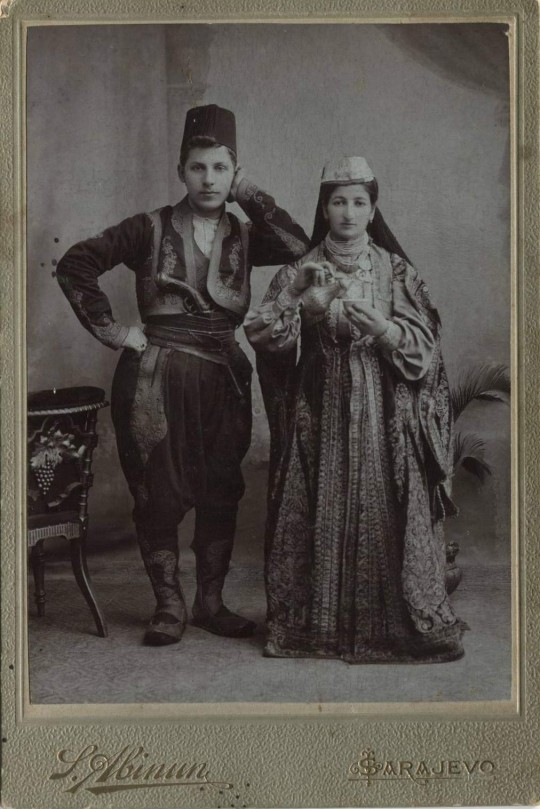
Jewish (Sephardic) couple from Sarajevo, Bosnia and Herzegovina, 1910
The first Jews came to Sarajevo, later called "Little Jerusalem", from the Iberian Peninsula in the early 16th century, bringing with them the Ladino language and Sephardi customs. A prosperous Jewish quarter with a synagogue was erected in 1577 under the pasha Siavush. Known to the Bosnians as tchifut-khan, the Jews themselves called it El Cortijo (the communal yard). Making up more than 20% of Sarajevo' total population, they maintained excellent relations with their Bosnian Christian and Muslim neighbors and held renowned positions as merchants, weavers, tailors, blacksmiths and hatchims (from the Arabic-Turkish Hakīm, "doctor"). With the Holocaust, this rich Jewish life and history tragically came to an end.
740 notes
·
View notes
Note
Sorry for grossing you out but uh, I have a complex claim to a lot of religions and cultures because of how colonialism (arguably Israel is a settler colony state so uh… hmmm) has impacted me.
As you’ve ascertained (correctly) I’m a non-Jewish American, only by technicality, because I haven’t found a rabbi that will even support the fact that I’m gay and the “three asks” thing feels like a troll move which feels… homophobic???
I need you to seriously consider how my life has been negatively influenced (hence the circumcision poll) by a bastardized JEWISH practice, and what the fuck that means for my identity as it feels like fate to some degree and a bit offensive that you would yuck my ability to find yum in Yhwh or w/e because I’m… too much of a faggoy? Idk man… just asking questions. I’d love to clarify your response in a dm since its… a lot. Not meaning to offend just sick of being put in a box because my circumcision and mother aren’t “right” enough to be in the in club because Hekate or Satan or whatever swooped in and said “NOPE” 🙃
Cheers
Trying to understand Israel through the lens of settler colonialism is a failing proposition. Consider the following:
Jews are indigenous to Israel. We have a historical record that says they’re from there in both the Greek and Roman written record. Like there is as much if not more evidence of Jews in Israel in Roman writing as there is of Julius Caesar being a real person. We also have archaeological evidence. Israel is covered with digs that find evidence of Jewish life dating back 2,000-3,000 years. We also have genetic evidence. DNA studies have shown that even super white looking Ashkenazi Jews have significant portions of DNA that are most closely related to other groups from the southern Levant.
So to call Jews settlers either denies all that evidence, insists that indigenous people can be settlers on their own land, or posits that indigenous people can somehow lose their status as indigenous if you wait long enough. The first is anti-intellectual and antisemitic, the second is ridiculous and the third is a dangerous line of thinking for all indigenous people. How long before Native Americans no longer have a claim to their land? How long before Maori no longer have a claim? It’s not really a place we want to go.
As for colonial, the definition of a colony is “a country or area under the full or partial political control of another country, typically a distant one, and occupied by settlers from that country.” So which country controls Israel? I think we’ve seen over the last year that it’s not the US given the way Bibi has repeatedly blown off Biden, so who is it? Which country is sending settlers to control the area? Again, it’s not the US. While some American Jews make Aliyah every year, the vast majority of Jews in Israel are either from Europe or the Middle East. To be a colony, you have to be a colony of some other power. What is the other power here?
So we can see that Jews are neither settlers nor colonizers. But you know who did colonize the area? Arabs. Arabs are indigenous to the Arabian peninsula, not Israel. And in the 7th century, Arabs came from the Arabian peninsula into Israel (and other places), conquered the locals and did their best to eradicate their cultures, forced conversions to the conquering religion, and settled in the new lands while being under the political control of the far away Caliphate. Sounds like settler colonialism to me. So if we must understand someone in the area as colonial (and I still don’t think it’s the best way to look at things, but if you do) then it’s the people that Palestinians are descended from.
Having said all that, just because colonialism has impacted you, it doesn’t mean you have a complex claim to Judaism. Here are ways you can have a complex claim to Judaism: 1) your father is Jewish and your mother is not, 2) you have Jewish ancestors who were forced to convert and you are now trying to reconnect with the religion that was taken from them. I don’t know your history, so it’s possible that one of those is true. But if you have no Jewish ancestry, then your claim is not complex, it’s non-existent, and if you do have Jewish ancestry but your ancestors willingly left the tribe, then you don’t really have much of a claim either. That doesn’t mean you can’t convert, but given that you seem to think you have claims on other aspects of Judaism as a non-Jew, my gut reaction is to be very doubtful toward your claim on Judaism in general.
If you can’t find a rabbi to support your conversion because you’re gay, you’re looking in the wrong places. The senior rabbi at my synagogue is gay, and we have several queer families as part of the congregation. There are literal signs on the door to the main office that say Trans and Queer Jews welcome here. This doesn’t mean that all congregations are welcoming, but lots are.
The three asks thing is a metaphor that some rabbis take literally. Converting to Judaism is a big decision. The three asks are to make sure that you’ve really thought about it and are really sure – that you’re taking it seriously and thought through all the consequences. If that feels like trolling to you, then maybe Judaism isn’t a good fit. Honestly, from my interactions with you this week, I would bet that the rabbis you’ve met with haven’t said no because you’re gay, they’ve said no because you don’t seem super interested in taking on Jewishness, you just want to take from it instead.
I don’t know what happened with your circumcision. If it went wrong and it was done by a mohel then you can feel angry toward the Jewish people I guess, but I would want to know why your parents had a bris for you if they weren’t planning on raising you Jewish. If you were just circumcised as a medical procedure, as many American babies are, then you may have trauma related to it, but you don’t need to be taking it out on the Jewish people, which is exactly what that poll was doing.
Don’t write down those four letters. Don’t try to pronounce them either. We have asked, repeatedly that people not do that, and once again, the fact that you are is super disrespectful to Jewish people. Write G-d, or God if you must, or even Hashem (I don't think goyim should, but it's better than what you did), but not those four letters. It’s not yucking your yum. You are allowed to enjoy what you want. But what you are doing here is the equivalent of coming into my house and saying that because my dinner looks delicious you can just reach onto my plate with your bare hand, scoop up some of what I’m eating, take a bite and throw the rest back. It’s disrespectful and offensive. I am not objecting to your joy, I’m objecting to your lack of respect to my culture.
Being Jewish is about more than just being circumcised and having the “right” mother. There is a culture here that you need to understand. If you are raised in it, then you get to join the club that way. If you’re not, then you can put in the work to learn it and learn to be respectful of it and join the club that way. So far, you haven’t been able to find a rabbi that thinks you’re willing to do that work, and from what I’ve seen, I’m willing to agree.
#asks and answers#I do not like blocking people#but this person was on thin ice to begin with#and I'm not sure how much more tolerance I can extend#they said previously that they're just annoying not a threat#and it's not that they're annoying it's that they're disrespectful and unrepentantly so
160 notes
·
View notes
Text
There's such an intricate interplay between antisemitism and islamophobia from the slacktivist left. For every reason they can think of to delegitimize the Jewish People's connection to Eretz Yisrael, it's propped up by some Noble Savage presumptions about Palestinians/Arabs/Muslims.
Since Jews in America are seen as a model minority, seen as having accessed whiteness and privilege, and "antisemitism" is at worst having to explain what Hanukah is to clueless Christians, the Left is confused as to exactly why Jews care about Jerusalem and the Land of Israel so much. Shouldn't they be above such petty and barbaric and outdated concerns such as a dusty old book from 2,000 years ago?
They should be more enlightened than that. They're all rich suburban secular Democrats. They're the leftist religion, according to bloggers on this very platform. There is no room for Judaism to be a religion, there's no acknowledgment of ancient customs, rituals, and the deep mysticism that's still alive and well in the Jewish community. There's no attempt to understand Jewish history and culture and why a group of people you think shares your vaguely atheistic vaguely liberal (and not in the Tankie sense) vaguely smug detached Western worldview... is more complex and unique than that.
Jews should be happy living in Diaspora because clearly the problem of antisemitism is fixed now, and never really was a problem in America. There must be something sinister behind a desire to reestablish a country by and for Jews. There must be something colonial, oppressive, European and White about it. Because why else would they do it? They have it good here. And no we won't acknowledge where Israelis primarily descend from because that requires us to do research and have a shred of nuance and integrity when it comes to Jews. No thanks!
A lot of the modern left is nonconsensually dragging Jews kicking and screaming from their own unique demographic toward the banal Norm. To themselves. But not totally. See they think they relate to Jews and vice versa, but not enough that when they think Jews should "know better," or haven't "learned their lesson," from the Holocaust, it engenders a deep seeded disgust and mistrust and rage that's not felt for actually privileged mainstream dominant society.
Conversely, the slacktivist Left sees Arabs as savages. Silly desert people who eat sand and worship a big black cube and cover every inch of their bodies for some reason. How quaint! When the Palestinian/Arab/Muslim cause explains that Jerusalem is important to them, the White Western Leftist nods sagely and says "Your culture is so valid queen," because they don't care. They just accept that Muslim society would be willing to fight over an ancient city proscribed as holy in dusty old tomes. Because that fits the narrative already surrounding Muslims.
They're seen as backwards, but the Left, reacting to their conservative parents and the Bush era, see "Muslims are backwards," and says not "No actually they're modern groups of people with practical geopolitical goals," but instead "Yeah and that makes them better than us!" Especially with this new crop of baby Leftists who think Islamo-Fascist "Feudalism" or whatever the best term would be, is aspirational or at least harmless... because it's not capitalism :)
So Muslims are infantilized and condescended to because the Western Leftist is still just as racist as their parents, but they feel guilty about their parents without considering their contribution to White Supremacy and the Post Bush surveillance state. And all the while Jews are reprimanded and held to an impossible standard because the Western Leftist, again, rejects their conservative parents' philosemitism, and decides that Jews Must be Punished when they step off the pedestal that Suffering the Shoah placed them on.
Jews should be above nationalism, Jews should know that demurely suffering pogroms and ethnic cleansing and genocide and general inequity and humiliation will earn them their divine reward in the end. Muslims should not be above nationalism, because they're not capable of being above it, and can't we throw them a bone, after all Obama was the worst president in history because of the Drone War and let's not mention George W Bush at all :0
Hot take, but I believe this is an essential underpinning of where the average disaffected White millennial/zoomer Leftist's head is at with regard to Israel and Palestine. They won't acknowledge it of course, but I can generally see through things like this.
1K notes
·
View notes